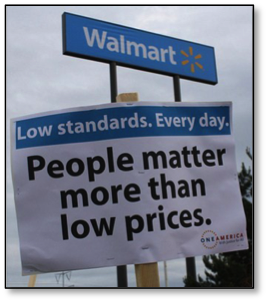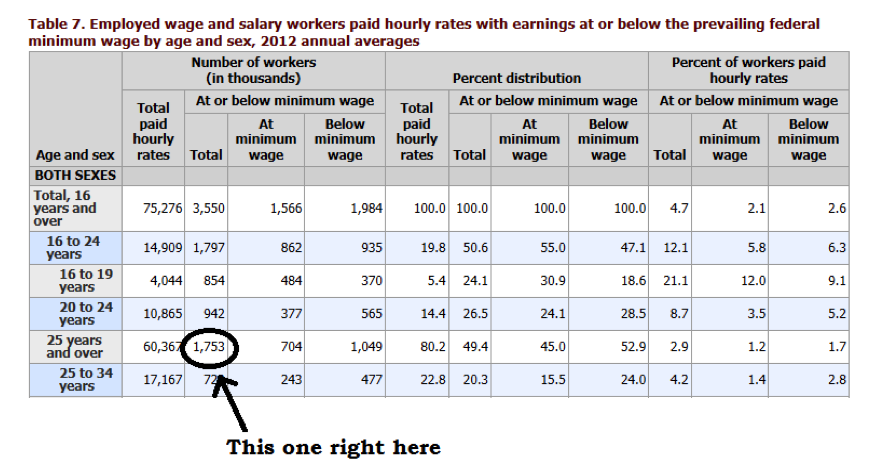The Case for Wage Hikes
2014/01/06 – (Winona, MS) Residents say it was around the late 1970s, possibly 1979, that Walmart first opened its doors on Applegate Street, in the little town of Winona, MS. At the time, town occupants were excited about the huge shopping center touching down near the municipal border of the small community on Highway 51. The new store was big, far bigger than most of the other family-owned stores lining the railroad at the municipality’s downtown section.
It carried things the other stores didn’t or couldn’t. It sold tires, pharmaceuticals, Christmas decorations, household goods—even pets. No other business in the area had sold live fish or reptiles up until then.
Things were good down on Applegate.
But nobody noticed a little further north, right after the exit on Summit Street, that the smaller retailers along the railroad were slowly closing up shop. A local five and dime store—a relic from an earlier age that sold small toys like pea shooters and Jacobs Ladder puzzles—shut down for good, as did the hardware store on the other side of Summit Street. One by one, most of these small stores locked their doors and went dark.
Walmart supporters might argue that these smaller businesses fell to pieces as a result of changing economic times as the nation moved steadily toward a big-box economy dominated by Walmart, K-Mart and other super-sized retailers. But few people who aren’t Walmart enthusiasts would claim that 1979 was a good time to be a sales employee anywhere but Walmart.
Source: http://blog.friendseat.com/mcdonalds-walmart-refuse-living-wage-to-employees/
It’s still not a good time to be an employee, particularly at Walmart, according to some Walmart workers living in the Jackson metro area. The company rarely pays significantly above minimum wage. If you do manage to qualify for a pay increase, that “raise” can often be represented by dropping three or four extra small coins into your hand once every hour.
Scheduling is also an issue, even in the stores that do not operate in 24-hour cycles. Management, according to employees, is oblivious to the importance of a stable work week. A young mother with two kids may work day-shift one week, but then find herself scrambling for baby-sitters the following week as she is moved to evening hours to fill schedule holes.
Combine that with Walmart’s love of part-time work and hatred for a 40-hour work week, and you’ve got an excellent formula for being impoverished while actually still being employed.
Head of Household
Apologists for the wealthy generally argue that raising the national minimum wage from its current $7.25 to anything higher is a non-starter for the country. Washington Post Columnist and reliable corporate flak George Will argued in a column reprinted in the December Sun Herald that “most minimum wage earners are not poor,” nor are they “heads of households.”
“More than half are students or other young, usually part-time workers in families whose average income is $53,000 a year, which is $2,000 more than the average household income,” Will opined.
Will undermined his own argument, however, by seizing upon a percentage that actually scares the hell out of you if you look at it from a different angle. Will said more than half of minimum wage workers are not heads of households. Of course, that leaves almost half of them with an increased chance of actually being household heads.
Take a look at the chart below. See that number circled down there indicating minimum wage earners 25 years of age or older?
Source: Bureau of Labor Statistics, “Characteristics of Minimum Wage Workers 2012,” http://www.bls.gov/cps/minwage2012tbls.htm
Multiply that figure up there by 1,000 and you’ve got 1.7 million. That’s 1.7 million people in the U.S. in 2012 that were most likely beyond their college years and working a minimum wage job. Considering that the average age of a first-time parent in the U.S. is age 25, you’ve got a reasonable chance of those same individuals having kids. (We’re moving into head of household territory here.) In fact, one of the few things keeping them from qualifying as head of household in the first place could be the fact that they have to take their kids and move in with Grandma because minimum wage doesn’t pay squat. They’re essentially kicked out of “Household Head” status by their squalid pay.
Leland resident Alisa Moss worked at the Walmart in Winona when it first opened. She was in her early 30s at the time. The pay was too low for her to live independently, so she took her two daughters and moved in with her mother to help ends meet while she worked there.
Moss represents no small percentage of Mississippi. According to Mississippi Public Broadcasting, 58,000 Mississippians earn minimum wage, and because this is a small, rural state, 58,000 is actually bigger than the entire population of Meridian, or the cities of Southaven or Biloxi. In fact, only the cities of Jackson and Gulfport have a bigger population than the number of people in the state currently trying to make a living on the butt-end of the nation’s pay-scale. There’s no denying that a wage increase would have a significant impact on a very significant percentage of the state.
Nevertheless, Will and other anti-labor types argue that working a minimum wage job is a conscious decision and that if you don’t like your minimum wage job you should just grab your bootstraps, get educated and get another job. The implication here is that you get the job you deserve.
But bootstrap pulling isn’t always an option in rural Mississippi.
“There was nothing else hiring in the area at the time,” said Moss, who worked at the Winona Walmart for 22 years. “You took that job there and dealt with the low pay because you were thankful they were hiring in the first place.”
Also, the argument that you can simply better yourself and get a higher paying job only works in a healthy economy containing a decent proportion of skilled labor jobs, rather than the rotten low-paying jobs that everybody is sinking into.
Remember that analogy of businesses closing down in Winona as Walmart opened up? That analogy can be applied to the general economy as well. According to a recent MIT study, more and more jobs are turning into Walmart-style jobs as low-standard service positions replace higher-paying industry jobs that once formed the basis of the nation’s middle class.
A report, co-authored by MIT economist David Autor and economist David Dorn, reveals that workers in many types of middle-rank positions, including skilled production-line workers and people in clerical or administrative jobs, have been pushed out of their jobs and forced into food-service, sales, and child-care industries, among other things.
“This polarization that we see is being driven by the movement of people out of middle-skill jobs and into services,” stated Autor in a December MIT press release. “The growth in service employment isn’t that large overall, but when you look at people with a non-college education, it’s a very sharp increase, and it’s very concentrated in places that were initially specialized in the more middle-skill activities.”
According to MIT, the service industry grew by 30 percent between 1980 and 2005. In fact, service occupations comprised 9.9-percent of labor hours in 1980, but today occupy 12.9-percent of labor hours, while better-paid industrial positions, like machine operators and assemblers, shrank from 9.9 percent of U.S. labor hours in 1980, to 4.6 percent in 2005.
In short, anybody pushing the bootstrap argument is not only a shameless hack, but a hack still living in the 1960s.
The service industry segment of the economy is growing so fast, in fact, that Autor suggested that government recognize the increasing number of workers in the service sector and support regulations concerning hours and working standards to accommodate it.
“It seems like people in these jobs are treated almost gratuitously badly,” Autor stated. “If you work in retail, it’s possible you won’t even know your hours until the beginning of the week. … Having uncertainty about your schedule from week to week, [when] you need to get your kids off to school, makes life that much tougher. … These jobs offer flexibility, but mostly to the employer.”
The United States, he said offers “almost no standards in this type of work.”
The Take Away
Make no mistake: These dirt-level work standards and garbage pay are whacking the middle-class like a massive economy-crushing hammer. The middle-class serves as the actual engine for the economy because it is the class that makes most of the purchases that drive the economy. If you stunt middle-class pay with stagnant wages, you’ll get fewer purchases being made because there’s less money to go around. Fewer purchases mean lower sales tax revenue, which means cuts to government programs that educate and maintain the middle-class—which leads to more middle-class people getting corralled into Walmart-style jobs.
This is an economically depressing pattern that feeds itself, and most of America is just now figuring this out. According to a recent Washington Post/ABC News poll, two in three Americans believe the wage base should be lifted. Eighty-five percent of Democrats support raising the national minimum wage to address income inequality. Even Republicans are mostly onboard with this idea, with the poll finding a 50-45 split among Republicans on this issue.
A wage hike, it turns out, is even popular in labor-hating Mississippi. A November Public Policy Polling glance found that Mississippi voters support a $10 minimum wage by a 54/37 margin, with Democrats favoring the idea 89-to-7-percent and independents favoring it by a 50-to-39-percent majority.
Opinion, apparently, favors a minimum wage hike, even up to the Washington-level, with President Barack Obama calling upon House Republicans to join him in passing a national minimum wage increase of about $10 per hour. The President made clear his argument favoring the hike last month.
“We know that there are airport workers, and fast-food workers, and nurse assistants, and retail salespeople who work their tails off and are still living at or barely above poverty,” President Obama said during a Dec. 4 speech in Washington. “And that’s why it’s well past the time to raise a minimum wage that in real terms right now is below where it was when Harry Truman was in office.”
Mississippi, help the President by making your support known to Congress. Contact your congressional state leaders below. It’s time to take the fight to the next step.
Sen. Thad Cochran:
Website: www.cochran.senate.gov
Phone: (202) 224-5054
Sen. Roger Wicker:
Website: www.wicker.senate.gov
Phone: (202) 224-6253
Rep. Alan Nunnelee District 1
Website: www.nunnelee.house.gov
Phone: (202) 225-4306
Rep. Gregg Harper District 3
Website: www.harper.house.gov
Phone: (202) 225-5031
Rep. Steven Palazzo District 4
Website: www.palazzo.house.gov
Phone: (202) 225-5772
###
Founded in 1909, the NAACP is the nation’s oldest and largest civil rights organization. Its members throughout the United States and the world are the premier advocates for civil rights in their communities, conducting voter mobilization and monitoring equal opportunity in the public and private sectors. For more information about the Mississippi NAACP or news stories, call 601-353-8452 or log on to www.naacpms.org. Friend us on Facebook by searching Mississippi NAACP and follow us on Twitter @MSNAACP.
Source: NAACPMS Staff





